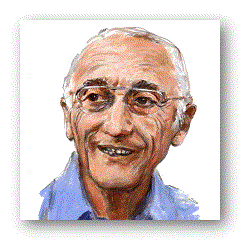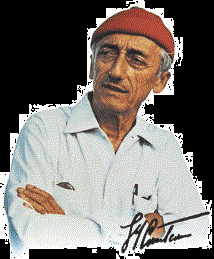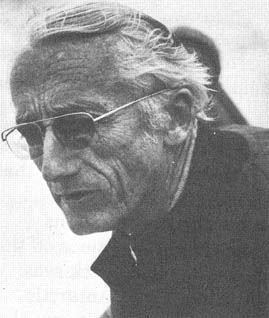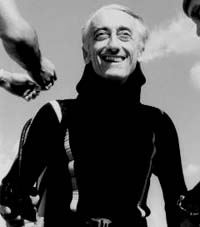 |
| Jacques Cousteau |
Josh Billings once quoted: “Consider the postage stamp: its usefulness consists in the ability to stick to one thing till it gets there.” At age 20 Jacques Cousteau had big plans for his future, including becoming an Air Force pilot and defending his country in WWII. Just before his final exam, Cousteau was involved in a car accident were he broke both of his arms. The doctors wanted to amputate, but Cousteau vehemently refused. By belief, perseverance and intense physical therapy Jacques was able to use both of his arms again. Ironically, this accident probably saved his life, as all but one of his classmates at the aviate school lost their life in World War II.
Born on June 11, 1910, in Saint- Andre, France, Jacques Yves Cousteau was a weak boy who suffered from acute Enteris and inflammation of the stomach. His father was Daniel Cousteau, a legal aid and companion to American millionaire Eugene Huggins. His mother, Elizabeth Cousteau, stayed at home and raised young Cousteau. At an early age he was fascinated by machines and water. Jacques was sent to school in which he failed and caused trouble. As a result he was sent to a strict boarding school, at which in 1920 he graduated with honors. In the early 20’s their family moved to New York accompanied by Eugene Huggins, but soon returned.
 |
| Cousteau |
“From birth, man carries the weight of gravity on his shoulders. He is bolted to earth. But man has only to sink beneath the surface and he is free.” That is what Cousteau later quoted as his experience the first time he looked underwater through goggles in 1936 and realized his obsession with undersea exploration. By this time, Jacques Cousteau was in the French Navy serving as a gunnery officer. He later trained to be a pilot, but was involved in a major car accident, as referred to earlier. Also, in that year he met his wife, Simone Melchoir, and together they had two sons: Jean Michel Cousteau and Philippe Cousteau. During World War II, Jacques Cousteau served as a spy in the French Resistance, but still found time to perform his underwater experiments. After the War, Cousteau was awarded several medals for his bravery and accomplishments, which included inventing the aqualung and using it for spying and attaching explosives to enemy ships.
In 1950, Jacques Cousteau retired from the Navy after being named Capitan de corvette or Lieutenant-Commander in English. He was elected to be president of the French Oceanographic Campaigns and soon purchased the ship Calypso on which he spent 4 years exploring the world oceans and making many fascinating discoveries. Following his expeditions he made two academy awards films: The Silent World (1956) and World without a Sun (1966), which were made to finance further explorations. Altogether during his career Jacques Cousteau made 115 films and 50 books, which included two famous books: The Living Sea (1963) and Jacques Cousteau: The Ocean World.
 |
| Cousteau |
In 1957, Jacques Cousteau became the director of the Oceanographic Museum of Monaco and founded the undersea research group and the Conshelf program which included a series of undersea research stations. They proved Cousteau’s prediction when he quoted, “Sooner or later man will live underwater and work there”.
Jacques Cousteau made his own television series named the “Undersea Word of Jacques Cousteau, which lasted 8 successful years, from 1968 to 1976. In 1974, Cousteau started the Cousteau society which was dedicated to the protection of marine ecosystems. To this day the society includes 300,000 members worldwide. Cousteau was awarded the Medal of Freedom by President Reagan in 1985 and honored by France with membership of the French academy. In 1977, Cousteau was awarded the United Nations Environmental prize.
 |
| (http://marenostrum.org/) |
Cousteau’s later years were filled with tragedies, but they never made him weak. It started when Jacques son, Philippe, died in a plane crash in 1979. The responsibility to carry on his father’s work fell on Jean- Michel, who at the time was involved in a legal battle with his father. Starting the 90s, Jacques' faithful wife died. This event was followed by the sinking of his boat Calypso. Nevertheless, Cousteau was trying to raise money for a new boat, Calypso II. Unfortunately, Jacques Yves Cousteau died on June 25, 1997, at the age of 87.
Jacques Cousteau once said “The impossible missions are the only ones which succeed.” A real hero does not have to be strong, smart or intelligent to prove that they can make a difference in the world. Jacques Cousteau had many obstacles and tragedies in his life that he was able to pass successfully. By doing the impossible he was able to accomplish his goals. “Anyone who has never made a mistake has never tried anything new,” which means that for great things to happen, mistakes must be made.
Page created on 4/9/2007 12:00:00 AM
Last edited 4/9/2007 12:00:00 AM
